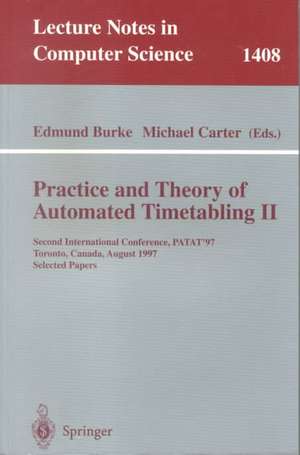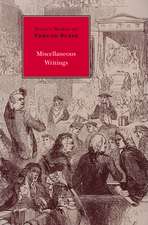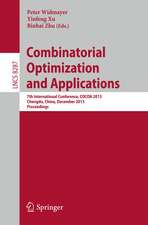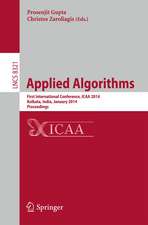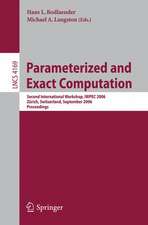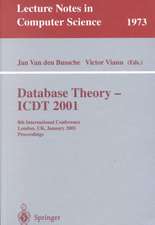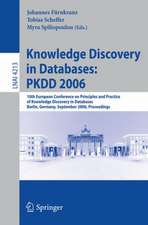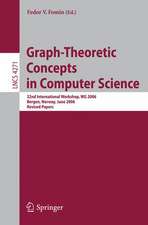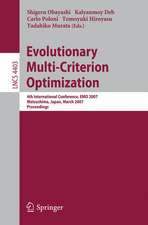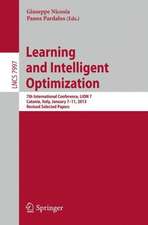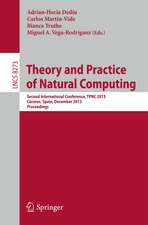Practice and Theory of Automated Timetabling II: Second International Conference, PATAT'97, Toronto, Canada, August 20 - 22, 1997, Selected Papers: Lecture Notes in Computer Science, cartea 1408
Editat de Edmund Burke, Michael Carteren Limba Engleză Paperback – 26 aug 1998
The 17 revised full papers presented were carefully selected for presentation at the conference and then had to pass a second round of reviewing. The book is divided into topical sections on surveys, tabu search and simulated annealing, evolutionary computation (population-based methods), constraint-based methods, graph theory, and practical issues.
Din seria Lecture Notes in Computer Science
- 20%
 Preț: 1061.55 lei
Preț: 1061.55 lei - 20%
 Preț: 307.71 lei
Preț: 307.71 lei - 20%
 Preț: 438.69 lei
Preț: 438.69 lei - 20%
 Preț: 645.28 lei
Preț: 645.28 lei -
 Preț: 410.88 lei
Preț: 410.88 lei - 15%
 Preț: 580.46 lei
Preț: 580.46 lei - 17%
 Preț: 427.22 lei
Preț: 427.22 lei - 20%
 Preț: 596.46 lei
Preț: 596.46 lei -
 Preț: 449.57 lei
Preț: 449.57 lei - 20%
 Preț: 353.50 lei
Preț: 353.50 lei - 20%
 Preț: 1414.79 lei
Preț: 1414.79 lei - 20%
 Preț: 309.90 lei
Preț: 309.90 lei - 20%
 Preț: 583.40 lei
Preț: 583.40 lei - 20%
 Preț: 1075.26 lei
Preț: 1075.26 lei - 20%
 Preț: 310.26 lei
Preț: 310.26 lei - 20%
 Preț: 655.02 lei
Preț: 655.02 lei - 20%
 Preț: 580.93 lei
Preț: 580.93 lei - 20%
 Preț: 340.32 lei
Preț: 340.32 lei - 18%
 Preț: 938.83 lei
Preț: 938.83 lei - 20%
 Preț: 591.51 lei
Preț: 591.51 lei - 15%
 Preț: 438.59 lei
Preț: 438.59 lei - 20%
 Preț: 337.00 lei
Preț: 337.00 lei -
 Preț: 389.48 lei
Preț: 389.48 lei - 20%
 Preț: 607.39 lei
Preț: 607.39 lei - 20%
 Preț: 1024.44 lei
Preț: 1024.44 lei - 20%
 Preț: 579.30 lei
Preț: 579.30 lei - 20%
 Preț: 763.23 lei
Preț: 763.23 lei - 20%
 Preț: 453.32 lei
Preț: 453.32 lei - 20%
 Preț: 575.48 lei
Preț: 575.48 lei - 20%
 Preț: 585.88 lei
Preț: 585.88 lei - 20%
 Preț: 825.93 lei
Preț: 825.93 lei - 20%
 Preț: 763.23 lei
Preț: 763.23 lei - 17%
 Preț: 360.19 lei
Preț: 360.19 lei - 20%
 Preț: 1183.14 lei
Preț: 1183.14 lei - 20%
 Preț: 340.32 lei
Preț: 340.32 lei - 20%
 Preț: 504.57 lei
Preț: 504.57 lei - 20%
 Preț: 369.12 lei
Preț: 369.12 lei - 20%
 Preț: 583.40 lei
Preț: 583.40 lei - 20%
 Preț: 343.62 lei
Preț: 343.62 lei - 20%
 Preț: 350.21 lei
Preț: 350.21 lei - 20%
 Preț: 764.89 lei
Preț: 764.89 lei - 20%
 Preț: 583.40 lei
Preț: 583.40 lei - 20%
 Preț: 649.49 lei
Preț: 649.49 lei - 20%
 Preț: 341.95 lei
Preț: 341.95 lei - 20%
 Preț: 238.01 lei
Preț: 238.01 lei - 20%
 Preț: 538.29 lei
Preț: 538.29 lei
Preț: 332.24 lei
Preț vechi: 415.30 lei
-20% Nou
Puncte Express: 498
Preț estimativ în valută:
63.57€ • 66.38$ • 52.62£
63.57€ • 66.38$ • 52.62£
Carte tipărită la comandă
Livrare economică 04-18 aprilie
Preluare comenzi: 021 569.72.76
Specificații
ISBN-13: 9783540649793
ISBN-10: 3540649794
Pagini: 292
Ilustrații: XII, 280 p.
Dimensiuni: 155 x 235 x 15 mm
Greutate: 0.41 kg
Ediția:1998
Editura: Springer Berlin, Heidelberg
Colecția Springer
Seria Lecture Notes in Computer Science
Locul publicării:Berlin, Heidelberg, Germany
ISBN-10: 3540649794
Pagini: 292
Ilustrații: XII, 280 p.
Dimensiuni: 155 x 235 x 15 mm
Greutate: 0.41 kg
Ediția:1998
Editura: Springer Berlin, Heidelberg
Colecția Springer
Seria Lecture Notes in Computer Science
Locul publicării:Berlin, Heidelberg, Germany
Public țintă
ResearchCuprins
Recent developments in practical course timetabling.- Space allocation: An analysis of higher education requirements.- Off-the-peg or made-to-measure? timetabling and scheduling with SA and TS.- Generalized assignment-type problems a powerful modeling scheme.- An examination scheduling model to maximize students’ study time.- A comparison of annealing techniques for academic course scheduling.- Some observations about GA-based exam timetabling.- Experiments on networks of employee timetabling problems.- Evolutionary optimisation of methodist preaching timetables.- Improving a lecture timetabling system for university-wide use.- A constraint-based approach for examination timetabling using local repair techniques.- Generating complete university timetables by combining tabu search with constraint logic.- Construction of basic match schedules for sports competitions by using graph theory.- A standard data format for timetabling instances.- Academic scheduling.- The implementation of a central timetabling system in a large British civic University.- A brute force and heuristics approach to tertiary timetabling.
Caracteristici
Includes supplementary material: sn.pub/extras
